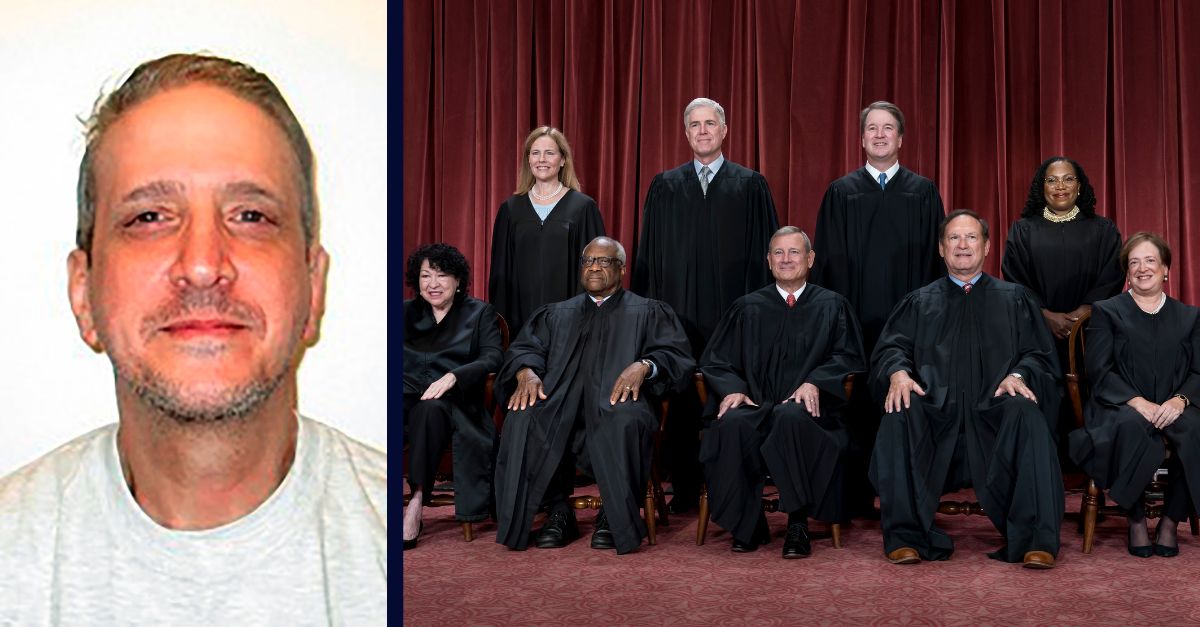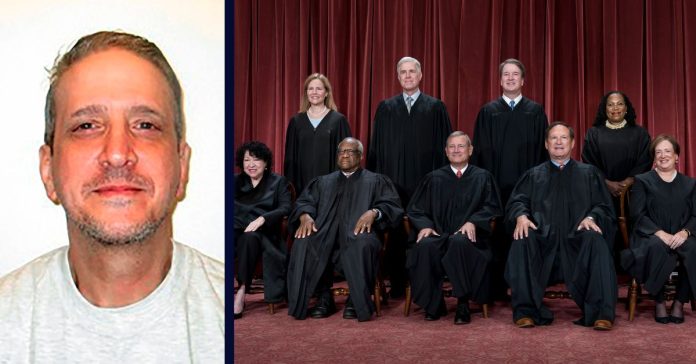
Left: Oklahoma death row inmate Richard Glossip (photo via the Oklahoma Department of Corrections via AP, File); Right: The Justices of the United States Supreme Court (Alex Wong/Getty images).
The U.S. Supreme Court agreed to hear the appeal of Richard Glossip, the Oklahoma death row inmate whose execution has already been rescheduled eight times. The case created an unusual battle between Oklahoma’s Republican Attorney General and its highest court.
The justices granted certiorari in Glossip v. Oklahoma on Monday morning and directed the parties to brief an additional question of state criminal procedure.
Glossip, now 60, was convicted in 1998 and sentenced to death for the murder-for-hire of his motel-owner boss, Barry Van Treese the prior year. It is undisputed that Justin Sneed actually killed Van Treese. Sneed, who had a history of drug abuse and psychiatric problems that was not disclosed by prosecutors, later testified that he named Glossip as a way of cooperating with prosecutors and avoiding the death penalty himself. Sneed also told other inmates that he acted alone to rob Van Treese with the plan that he and his girlfriend would use the robbery funds to buy drugs.
Glossip’s conviction was overturned in 2001 due to ineffective defense counsel. He got a new trial, was re-convicted in 2004, and once again sentenced to death.
Glossip was to be executed in 2015, but when prison officials realized they received the wrong lethal drug just hours before Glossip was to be put to death, his execution was halted. Later investigation revealed that the same incorrect drug had been used to execute another inmate earlier the same year.
Glossip’s execution had not been the only death sentence plagued by procedural problems. The execution of inmate Clayton Lockett was stopped when Lockett began to groan, convulse, and speak during the execution process after already being declared unconscious. Lockett suffered a heart attack and died 43 minutes later. Oklahoma temporarily paused all its executions while investigations were completed.
In February 2022, a bipartisan group of 35 Oklahoma legislators hired pro bono lawyers at law firm Reed Smith to review the Glossip case. Ultimately, that investigation revealed “significant evidence of government misconduct and destruction of evidence.” Also in 2022, Oklahoma resumed executions after six-year hiatus, then planned the executions one prisoner per month for nearly every month starting in August and continuing through December 2024.
Before the Glossip findings were finalized, though, then-Oklahoma Attorney General John O’Connor petitioned the Oklahoma Court of Criminal Appeals for execution dates for Glossip and 24 other death row inmates. Five days after O’Connor’s petition was filed, Reed Smith issued its report that concluded there had been evidence of prosecutorial misconduct and that Glossip was likely innocent.
The appeals court granted O’Connor’s request and set an execution date for Glossip. Gov. Kevin Stitt temporarily stayed Glossip’s execution on Aug. 16, 2022, to give the appeals court time to consider Glossip’s appeal. In April 2023, the Oklahoma Court of Criminal Appeals upheld Glossip’s conviction and the state’s Pardon and Parole Board rejected his request for clemency. The appeal of that ruling is what is before the high court now — although O’Connor is no longer Oklahoma’s top lawyer, and his successor does not want the execution to proceed.
On July 5, 2023, Oklahoma Attorney General Gentner Drummond petitioned the Supreme Court on behalf of Glossip asking that Glossip be given a retrial — an unusual move, particularly in light of the fact that the victim’s family and the Oklahoma District Attorneys Association stood opposed. In Drummond’s petition, he said, “After careful consideration — including a thorough review by an independent counsel — the State [of Oklahoma] came to the conclusion that … ensuring that justice is done in this case requires a retrial.”
In the brief, Drummond argued that allowing the injustice of executing Glossip after Oklahoma admitted its own failings would be “unfathomable.” Drummond made headlines when, during his 2018 campaign for Attorney General, he featured photos of murdered University of Iowa student Mollie Tibbetts in a segment that said “illegal aliens” are committing “the most heinous crimes.”
The parties in the Glossip case will now submit briefs on the substantive issues of law at play in Glossip’s case and the matter will be placed on the high court’s calendar for oral arguments. The justices, except for Justice Neil Gorsuch, will hear argument next term. Gorsuch was recused from the Court’s decision to hear Glossip’s appeal and will continue to be recused as the case proceeds because he heard part of the case as an appellate court judge.
This week, the justices will have the chance to grant a last-minute reprieve in another death penalty case: Alabama’s execution of Kenneth Eugene Smith via “nitrogen hypoxia.”
Alabama is set to execute Smith on Jan. 25, 2024 by an “experimental” gas method never before used in the U.S. The 58-year-old Smith will be put to death via nitrogen hypoxia — inhalation of pure nitrogen. The state authorized the use of nitrogen hypoxia in a statute, but has never actually used it in an execution.
Smith’s case came before the Supreme Court at an intermediate phase as the justices heard an appeal over an order to stay his execution. At the time, Justice Clarence Thomas — a stalwart supporter of the death penalty — called Alabama’s statutory authorization of nitrogen hypoxia “simply irrelevant” to the constitutional question of whether the Eighth Amendment would permit the use of the method in Smith’s execution.
Have a tip we should know? [email protected]

